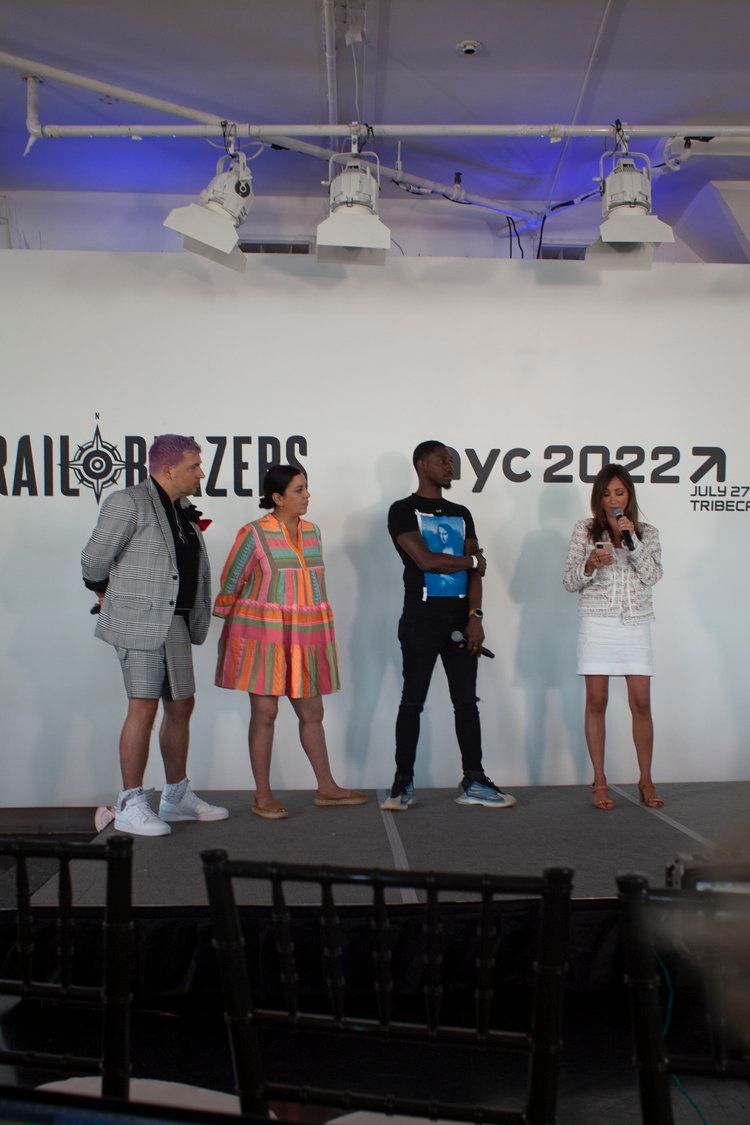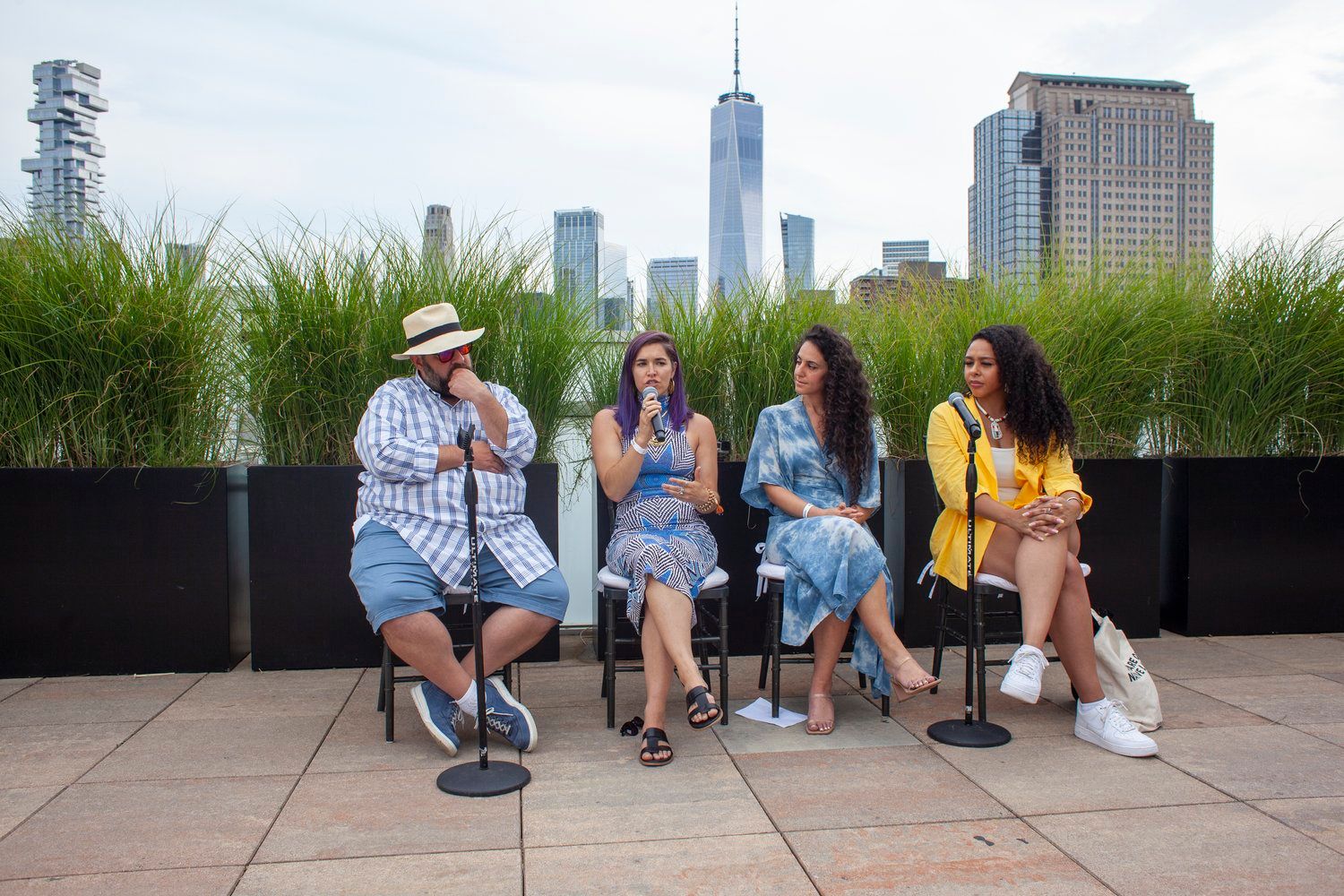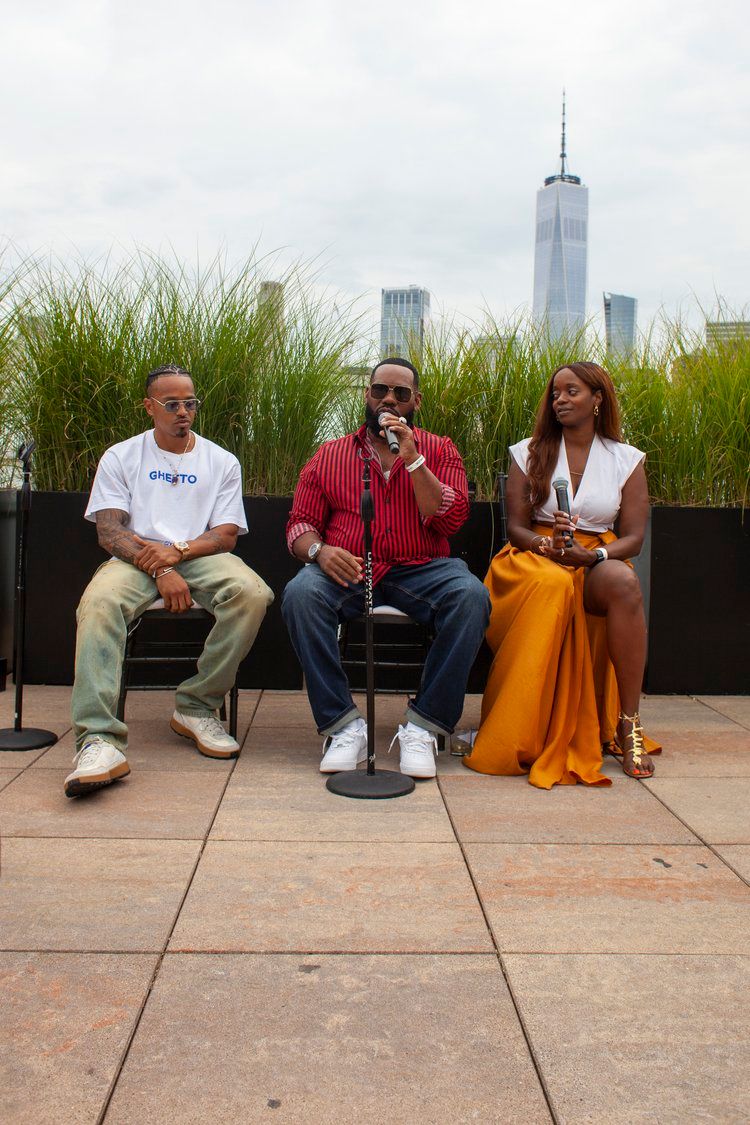What happens when a highly cultivated professional group takes over New York’s urban jungle? The harmonic elevated experience of Trailblazers, of course! Often described as “adult summer camp,” Trailblazers is a curated community of cannabis and psychedelics business leaders who gather together for retreats focused on advancing the industry. These beyond-conferences have typically been held in desert expanses or forested resorts, allowing attendees to immerse themselves in nature. But in the last week of July 2022, Trailblazers braved Manhattan’s mix of grit, glamour and concrete to debut its first-ever New York event.
As it turned out, a daylong gathering at the luxury hospitality space Tribeca Rooftop / Tribeca 360° brought the emotional power and prestige of Trailblazers to the fore with alacrity. From the mainstage panels to the healing Wellness Lounge to the rooftop, every offering imbued guests - 150-plus executives and thought leaders - with the sense of a once-in-a-lifetime party. (If that sounds like your kind of party, check out the Trailblazers website now to learn how to apply for membership! New networking opportunities, exclusive digital content, and many other perks await. You can also sign up for the next Trailblazers gathering in Ojai, California, October 10-12 by clicking here.)
Check out highlights from Trailblazers New York!
What Is Trailblazers?
“We started Trailblazers around a circle of trust,” said co-founder Tyler Wakstein in greeting. “Everyone here is now invited to the circle.”
“Let’s elevate and amplify each other,” exhorted Kim Dudine, who oversees Trailblazers’ strategic operations and serves as attendees’ main point of contact.
Wakstein, co-founder and CEO of OpenNest Labs, started Trailblazers in 2018 with David Denberg, a leadership culture maven noted for founding extensive entrepreneurship communities; and Peter Gross, co-founder of Coalition Entertainment; Trailblazers capitalizes on what Wakstein explains as “creating unique vessels and spaces for people to gather, connect, share, learn, be inspired.”

Trailblazers New York: Opening Plenary On Diversity And Cannabis Policy
At the opening plenary of the New York program, with primary sponsorship by Weedmaps, AYR Wellness, Alpharoot and others, the Trailblazers team explained that hosting an event in the Empire State was important because of its special status in the cannabis industry. Not only is New York City the cannabis consumption capital of the world, but New York State’s Marijuana Regulation and Tax Act (MRTA) contains the widest-ranging social equity legislation in the country for establishing legal cannabis regulations. Plus, who doesn’t have fun in the City That Never Sleeps? New York combines all the elements in Trailblazers’ formula: Forward thinking, inclusivity, and nonstop joy.
The day’s opening plenary kicked off with remarks from members of Trailblazers’ Diversity, Equity and Inclusion Board: Kristina Lopez Adduci, founder and CEO of House of Puff; Tahir Johnson, Director of Equity and Inclusion at the Marijuana Policy Project; Jake Wall, co-founder and Chief Innovation Officer of MAISON BLOOM; Jen Lujan, Senior Director of Social Impact at Eaze. After discussing the significance of DEI in the Trailblazers mission, they turned the stage over to an incredible array of guest speakers.

Ethan Nadelmann, founder of the Drug Policy Alliance, gave a spellbinding speech about looking toward “ethical applications” of cannabis reform. He noted that as the for-profit parts of the industry have moved in, they brought disruptive technologies with them – such as different kinds of vaporizers and devices – which represent harm reduction efforts.
“When we talk about better cannabis policy, it needs to be part and parcel of a broader drug policy holistically,” Nadelmann stated. “Let’s think about our responsibility for the future of this industry, not just for cannabis, but more broadly for our society.”
Marijuana Policy Project's Toi Hutchinson Speaks At Trailblazers New York
Toi Hutchinson, CEO of the Marijuana Policy Project, brought the house to tears as she described her lifelong history with cannabis. Watching her grandfather roll joints from a young age, Hutchinson recalled, “I grew up with cannabis culture which was so loving, where what you say is exactly what you get… That’s why spaces like [Trailblazers] are so important.”
She became an advocate, and politically involved, holding a seat in the Illinois State Senate for ten years. During that time, she garnered the nickname “Marijuana Mom” for her passions: cannabis legalization and motherhood. Hutchinson was also the 46th president of the National Conference of State Legislatures, and in the middle of that forum she heard conversations around the Trayvon Martin case, linking cannabis and racism. She remembered thinking about her own sons, young Black men standing 6 feet tall, who could easily have their lives ruined by a justice system based on stereotypes and built to criminalize cannabis.
“When I talk about the normalization, legalization and responsible regulation of cannabis, I talk about it as a mom first,” Hutchinson commented. “Not just for my kids, but for all kids.”
Eventually Illinois Governor JB Pritzker tapped Hutchinson to be the state’s first “cannabis czar” in charge of the legal industry’s regulatory program. She agreed to live up to her “Marijuana Mom” moniker. “There are two questions that I ask myself every single day. If we are to… end the prohibition on the whole War on Drugs, what would that look like? Because we’re still going up against two multimillion-dollar industrial complexes to do this. You’ve got the criminal industrial complex and the pharmaceutical industrial complex. Neither one of those two industries necessarily wants what’s happening in this group to explode.”
But when the Marijuana Policy Project asked Hutchinson to lead the organization, she couldn’t resist an opportunity to inform cannabis policy for the entire nation, state-by-state. She compared the work of cannabis advocacy to motherhood: “We’re giving birth to a new industry… And that means right now we’re in labor. Labor hurts and contractions are necessary. And the only way I know how to get through contractions is to push, and to keep pushing.”
Chris Wilson's Story Inspires Trailblazers Attendees
Following Hutchinson, social entrepreneur Chris Wilson told his incredible life story. He spoke of numerous tragedies, watching his family members being beaten, brutalized, sexually assaulted and murdered through his childhood and teenage years. At age 17, he was charged with a crime, convicted and sentenced to life in prison. While incarcerated, Wilson developed a what he calls “a Master Plan for self-improvement and helping others.” He became a mentor, earned his high school diploma and Associates of Arts degree, started a career center, learned several languages, and ultimately was deemed eligible for release after serving 16 years. Wilson is now the founder of multimillion-dollar enterprises, including the Baltimore-based Barclay Investment Corporation, a multi-service organization collaborating with local workforce and social service providers to help unemployed city residents; high-end furniture restoration company The House of DaVinci; and social impact content development company Master Plan Productions.

Trailblazers New York And The Legacy Cannabis Market
Where the New York Trailblazers gathering really shone was in its ability to spotlight people in similar spaces with different opinions. The Legacy Industry panel showcased how the East Coast’s veteran entrepreneurs infuse diversity of thought into their community. Saki Fenderson of TLBK, Sky Cohen of MEDLY, and Vladimir Bautista of Happy Munkey debated the future of legacy-to-legal transitions in New York’s cannabis economy, while attorney Jessica Gonzalez of Hiller PC moderated.
“Legacy operators aren’t a monolithic group,” Cohen asserted. “[We need] active acknowledgement… not just cultural liberation, but access to capital.” He went on to say that prioritizing social equity cannabis licenses, as New York is doing, doesn’t make up for 60 years of failed policy, and that tax redistribution would be a much better way to achieve equitable goals.
“Why do I have to choose between being a social equity applicant and being a successful entrepreneur?” Cohen asked.
Fenderson, who came from a family of prohibitionists, argued in favor of more open pathways for legacy entrepreneurs to enter the legal space, without so many stipulations about government-assisted business training. Though New York has been the first state to incorporate the legacy market into legal regulations, its social equity approach has been criticized by some as restrictive and patronizing, particularly the requirement that government-assisted retailers will have the state assign a location to them.
“They don’t need business advice; they already know how to run a successful business,” Fenderson insisted. “What regulation does is help them do what they know how to do with government protections.”
Bautista had a more hopeful message for those in the audience: “Social equity is an issue for every state in the country. Whatever you wish the cannabis world to be in the future, be that today.”

Government Representatives And Corporate Social Responsibility Experts Discuss Cannabis Policy At Trailblazers New York
In a landmark panel, Trailblazers convened government representatives and Corporate Social Responsibility (CSR) experts for a conversation on public policy. Every panelist was a person of color, with several representing districts in Brooklyn, Queens and Massachusetts that have been subject to overpolicing and suffering under the War on Drugs. Moderated by Khari Edwards, Head of CSR at AYR Wellness, the panelists included Ryan Dominguez, Executive Director of Mass Cultivated; Rep. Chynah Tyler of Massachusetts’ 7th District (also chair of the Massachusetts Black/Latino Caucus and Chair of the Judiciary Committee); Shanita Penny, founder/CEO of Budding Solutions and SVP of Forbes Tate Partners; Ngiste Abebe, Vice President of Public Policy of Columbia Care; Assemblywoman Stefani Zinerman of New York’s 56th District; Marvin Holland, Chief of Staff to New York Senator James Sanders, 10th District; Assemblywoman Kimberly Jean-Pierre, New York’s 11th District.
Jean-Pierre, a native Brooklynite who now represents Long Island neighborhoods in Suffolk County, enthused about how the MRTA has established a legal cannabis industry where Black and brown communities will have access to professional and personal resources. Shouting out Assembly Majority Leader Crystal Peoples-Stokes, who first sponsored the bill, Jean-Pierre observed that the MRTA took cues from programs in other states and that New Yorkers have been able to focus on BIPOC ownership.
Assemblywoman Zinerman, a fourth-generation farmer and Chair of the state’s University Workforce Committee, occupies the government seat formerly held by Tremaine Wright, New York’s Cannabis Control Board Chair. Zinerman beamed with pride as she spoke about the cannabis movement’s most substantial actions being led by women.
“This was so important for women’s voices to be heard, in heading up the social equity movement,” said Zinerman. “And so for us it really is about reparations, and about the health and wellness of our community.”
Chynah Tyler noted that Massachusetts’ long history with medical cannabis prepared that state for several aspects of adult-use legalization, but emphasized that state governments still need a lot of help developing an equitable cannabis workforce.
Ngiste Abebe mentioned how Columbia Care, as one of the largest multi-state operators (MSOs) in New York, was working to support partnerships with smaller businesses. In her opinion, large-and-small-business partnerships are the future of the cannabis industry: “Everybody has started to recognize that the idea that you can have a limited license market that has all of these competition barriers and that’s the only way that you’re going to get to profitability is a fallacy. Any large company that thinks that their own profitability is to elbow everybody else out of the market, not to compete in a market with the best possible products, is wrong… The only way to success is if you help folks enter the market from legacy to legal and if you are a partner in that… ‘Cause the more folks we have operating on the legal side of the industry, the more effective we are all together… We need to fix the mess that Schedule I prohibition of cannabis creates, not just for the substance, but for research, for access to capital, so that you actually have a successful industry that works for everyone.”
Meanwhile, industry veteran Shanita Penny pointed out that the government needs to hold cannabis companies accountable if they don’t live up to the terms of contracts regarding inclusivity hiring, safe working environments, and other forms of compliance. “Small and big partnerships are going to be critical. We can’t rely on the government to get this right… As consumers, we have an opportunity to hold these companies accountable by not shopping with them.”


Raekwon The Chef On East Coast Culture, Multi-State Operators, Psychedelics And More At Trailblazers New York
Other outstanding panels featured the “captains of industry” – MSO leaders Kim Rivers of Trulieve, Matt Darin of Curaleaf, and Jennifer Drake of AYR Wellness – and a deep dive into the future of psychedelics with Liana Gillooly, Strategic Initiatives Officer of the Multidisciplinary Association for Psychedelic Studies (MAPS); Simeon Schnapper, Managing Partner of the JLS Fund; Sutton King, co-director of the Urban Indigenous Collective; and Hadas Alterman, founding partner of Plant Medicine Law Group.
Finally, when the crowd gathered up on the roof for the day’s last legendary panel, an icon took the mic. Rapper Raekwon the Chef, a founding member of the great Wu-Tang Clan, joined Cannaclusive co-founder Mary Pryor and Ghetto Gastro co-founder Pierre Serrao to discuss East Coast culture and the legal cannabis industry.

“I tell people all the time, life is like a bowl of cereal, and cannabis is the spoon,” the musical artist asserted. “It did so much for our communities and I finally got my day to see cannabis turn legitimate and really allow people to get jobs and further their knowledge of the business of cannabis.”
Raekwon mentioned his brand Hashtoria, operating for the last four years, but spoke with particular pride about his newer partnership with the organization Citizen Grown. Known as “the superheroes of cannabis,” the Citizen Grown team is inspired by the universal income proposal. They supply people in communities adversely impacted by the War on Drugs with special boxes that allow home cannabis cultivation, and provide various resources from education to direct community reinvestment to support the flourishing of local entrepreneurship.
“A lot of times people capitalize off of anything that comes from our communities,” Raekwon said. “Citizen Grown brought not only this cannabis grow, but that big brother, big sister factor.
Serrao, whose Ghetto Gastro seeks to “nourish the world” through plant-based takes on traditional Black culture-centric recipes, commented that the most important part of cannabis for him is meeting people on their own level. For many, it’s the introduction of cannabis as a medicine instead of a criminalized drug to be feared. He did acknowledge, however, that the overall cannabis industry is suffering from knowledge gaps because not all brands and cultures know about each other. The solution to Serrao is clear – mix up the information!
“There’s a whole lot of salt, but we need the pepper and the salt shaker,” said the culinarian.

Trailblazers in New York seemed to get the balance of all seasonings just right for this flavorful affair. As knowledge seekers wandered through the venue, they could indulge in soulful activities too. The spiritual workers of One Frequency helmed the Wellness Lounge, which offered sound baths, Reiki, energy healing and Hape experiences all day. In the afternoon, House of Puff hosted a Puff and Paint session. MAISON BLOOM encouraged visitors to taste-test its unique infused drink flight (we find Peche-Honeysuckle, unsurprisingly, the sweetest of their vittles). MEDLY and Azuca offered samplings of their high-level wares. Music everywhere, first by Grammy-nominated DJ J Patt and DJ Pirumov, then by a classical string quartet, turned Tribeca Rooftop into a glorious open-air concert. It was a pure symphony for the senses.
While Trailblazers returns to the West Coast for an October retreat in Ojai, California, their inaugural urban outing was a smashing success. Where else can you laugh, cry, and get high on life (with a little help from your friends)? You have to start by being willing to blaze a trail.









Find out more about Trailblazers by visiting trailblazerspresents.com. Register now for Trailblazers Ojai, October 10-12, 2022, by clicking here.
Find Out More On Social
--
Featured image: Pierre Serrao, founder of Ghetto Gastro / Ghetto Ganja; Mary Pryor, co-founder of Cannaclusive; and Wu-Tang Clan's Raekwon the Chef, founder of Hashtoria and partner in Citizen Grown. (C) Trailblazers



